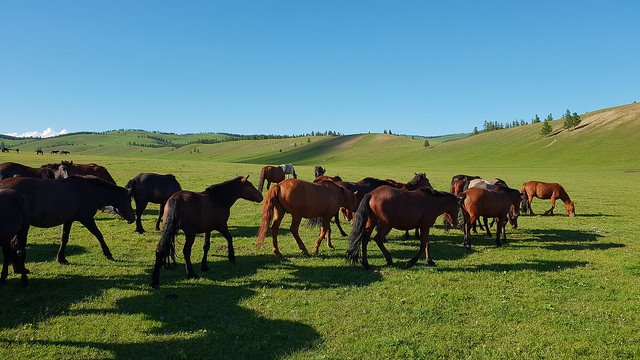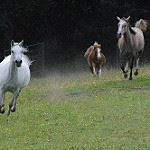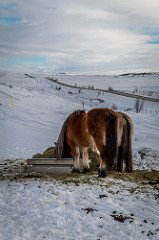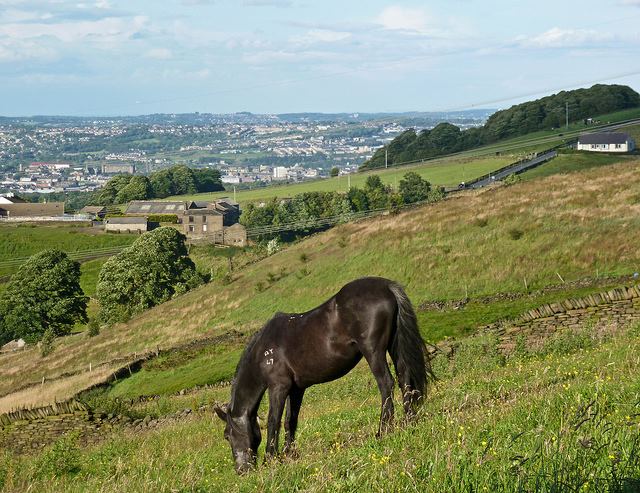Quick Answer: Horses are diurnal. They sleep 5 – 7 hours during night.
Have you ever watched the movie “Spirit: Stallion of the Cimarron” before? If you have not, I recommend watching it. This movie brilliantly shows you the impressive life wild horses have. They like freedom, they live together as a herd. They are incredibly emotional and intelligent creatures. It’s no wonder we humans bond with them! (IMDB, 2002).
What Time of Day Are Horses Most Active?
Horses, like humans, are largely diurnal creatures. They are most active during the day. (Staff, 2017).
The fact that they are diurnal has probably strengthened the relationship between horses and humans through the centuries. It was critical for us humans that horses be active during the day. In older times we used them as pack animals, labor animals, and of course, as dear friends!
Are Horses Crepuscular?
Horses can be active in the twilight hours, but they are not crepuscular to the same degree as many other crepuscular creatures. For example, many big cats will sleep 16-20 hours a day. These big cats are almost exclusively active during the hours around sunrise and sunset. This is not the case with horses.
Are Horses Nocturnal?
No. Because horses are not active in the night. They use this time to sleep well. They spend the whole day standing, feeding, moving, and running around. This circadian rhythm is true for both wild an domesticated horses.
If they are domesticated, they have lots of activities during the day. In a zoo, for example, they will have lots of visitors and fun activities to do.
In very rural parts of the world, they are still used as a supplement to human labor. Meaning they help till the soil and help carry things around.
Interestingly enough, all members of the Equidae family sleep at night, as they are very active in the day. (Insurance, 2018).
Are Horses Diurnal?
Yes, they are largely active during the day, just like humans. They sleep on average 6 hours a night.
Are Horses Matutinal?
As Diurnal creatures, it’s not uncommon to see horses active in the morning. You can consider them matutinal, as they are active in the mornings. But they are not matutinal in the strictest sense of the word.
Are Horses Vespertine?
As Diurnal creatures, it’s not uncommon to see horses active around sunset. You can consider them vespertine, as they are active in the evenings. But they are not vespertine in the strictest sense of the word.

Horse Sleeping Facts
Horses are big animals. This means that it requires them quite a bit of effort lay down and stand back up. When horses lay down, some important physiological processes occur. For example, laying down tends to actually cut off blood flow to certain parts of the horse’s body. This lack of blood flow can cause a whole host of problems for the horse.
In addition, horses think like prey animals; they know that a predator could come along at any time. They know the predator will not be kind enough to give a warning…
So, at all times, horses greatly prefer to have one or two horses in the herd stand watch while they sleep.
Getting up and down is hard for horses of all ages, but it’s even tougher for older horses. This is somewhat balanced out by the fact that adult horses sleep less than younger horses. Young horses have a longer circadian cycle.
While horses can’t get REM sleep while standing up, they can still get some useful rest. They have a mechanism where their kneecaps lock up, and the ligaments and tendons will keep the horses’ alignment while sleeping. This helps the horse rest without forcing it to lie down. (Post, 2008).
So if you are driving by a pasture and see horses lying down, don’t worry! Horses do need to lay down to sleep occasionally. (O’Brien, 2014).
Do Horses Sleep with Their Eyes Open?
Yes. This is the light sleeping mood of them during the day. But they do need to close their eyes to achieve a rapid eye movement (REM) type of sleep. This is the so-called deep sleep you hear about. You can distinguish the difference between deep and light sleep in horses if you can watch them closer. If their heads are down and lower lips are dropped, this indicates they are asleep. If their heads are up, this means they are awake (Wonderopolis, 2014).
Do Horses Sleep Standing Up?
Yes, this happens during light sleep. Horses will often take daytime naps while standing up.
How Do Horses Sleep Standing Up?
Horses have some amazing body mechanisms. They have a unique elastic connection between their bones and joints. These connections allow them to stand in a special way, giving them an ability to relax while standing all the time. This mechanism is known as “Stay Apparatus.”
Do Different Species of Horses Have Different Sleeping Patterns?
Horses are a member of the Equidae family. This family contains horses, zebras, and donkeys. Most of them have the ability to sleep standing up like horses.
Like horses, they sleep during the night and stay standing while feeding and moving around during the whole day. It seems like the circadian rhythm is similar for the entire family of Equidae. This means they mostly follow horse sleeping hours.
How Long Do Most Horses Sleep?
Average sleeping hours for horses are five to seven hours, that includes both laying down and standing up sleep. Younger horses tend to sleep more hours, up to 10 hours in some cases. While older horses have a shorter circadian clock.


Conclusion
Horses have been domesticated by humans since the stone ages. They are used in transportation, for riding, for pulling plows, or for pulling carriages.
In festivals like the circus, they can be used as entertainment.
In some countries, horses are used to aid policeman. Historically horses were used extensively in warfare. They were used for both hauling war supplies, and as a sort of biological tank in cavalry charges.
Horses have played a roll in medicine as well. They were used in earlier ages to extract insulin, as their bodies have some substantial quantities of it. Insuline is used in the treatment of diabetes. As we can see, horses are amazing animals.
Learning about their habits and preferences allows us to be better owners that create environments where our horses can thrive. Understanding these beautiful creatures will ensure that humans and horses continue to live together even as modern technology replaces many of the horses’ historic duties.
Title image source
References
IMDB, 2002. Spirit: Stallion of the Cimarron. [Online]
Available at: https://www.imdb.com/title/tt0166813/
[Accessed 6 Dec 2018].
Insurance, A. F., 2018. How do Horses Sleep?. [Online]
Available at: https://www.animalfriends.co.uk/pet-advice/horse-advice/how-do-horses-sleep/
[Accessed 6 Dec 2018].
Johnson, K. S., 2018. DO HORSES CLOSE THEIR EYES WHEN THEY SLEEP?. [Online]
Available at: https://animals.mom.me/horses-close-eyes-sleep-3772.html
[Accessed 6 Dec 2018].
O’Brien, D. A., 2014. Contrary to Popular Belief, Horses Do Not Sleep Standing. [Online]
Available at: https://www.petmd.com/blogs/thedailyvet/aobriendvm/2014/november/contraray-popular-belief-horses-do-not-sleep-standing-321#
[Accessed 6 Dec 2018].
Post, W., 2008. Ever wondered why horses sleep standing up?. [Online]
Available at: http://www.washingtonpost.com/wp-dyn/content/article/2008/07/13/AR2008071301635.html?noredirect=on
[Accessed 12 Dec 2018].
Staff, K. E. R., 2017. Sleep Requirements of Horses. [Online]
Available at: https://ker.com/equinews/sleep-requirements-horses/
[Accessed 6 Dec 2018].
Wonderopolis, 2014. Do Horses Sleep Standing Up?. [Online]
Available at: https://wonderopolis.org/wonder/do-horses-sleep-standing-up
[Accessed 6 Dec 2018].
